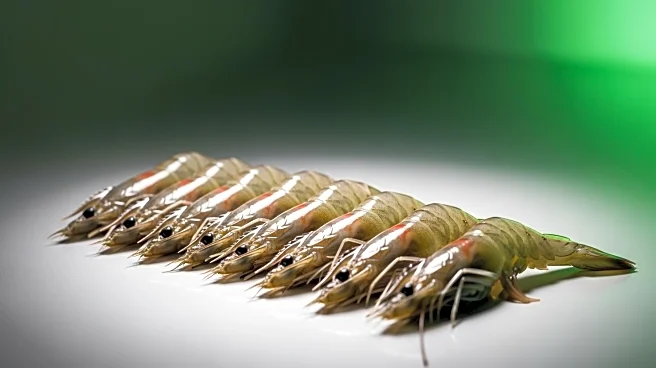What's Happening?
The Food and Drug Administration (FDA) has expanded its recall of frozen shrimp products due to potential contamination with Cesium-137, a radioactive material. Nearly 85,000 bags of shrimp sold at Kroger and affiliated grocery chains have been recalled. The recall was initiated by AquaStar (USA) Corp. following FDA warnings about possible contamination. The shrimp products affected include Kroger Raw Colossal EZ Peel Shrimp, Kroger Mercado Cooked Medium Peeled Tail-Off Shrimp, and AquaStar Raw Peeled Tail-on Shrimp Skewers. These products were distributed to grocery stores in 34 states, including major chains under the Kroger umbrella. The FDA is investigating Indonesian seafood processor PT. Bahari Makmur Sejati after traces of Cesium-137 were detected in its shrimp shipments. Although no illnesses have been reported, the FDA warns that repeated low-dose exposure to Cesium-137 may increase cancer risk over time.
Why It's Important?
This recall highlights significant concerns about food safety and the potential health risks associated with radioactive contamination. Cesium-137 is a man-made radioactive isotope that can cause DNA damage, increasing cancer risk with prolonged exposure. The recall affects a large number of consumers across 34 states, emphasizing the need for stringent safety measures in food processing and importation. The situation underscores the importance of regulatory oversight by the FDA to protect public health. Retailers and consumers must remain vigilant about product safety, and the recall may impact consumer trust in seafood products, particularly those imported from regions with less stringent safety protocols.
What's Next?
The FDA will continue its investigation into the source of contamination and monitor shrimp imports from PT. Bahari Makmur Sejati. Retailers are expected to comply with the recall and remove affected products from shelves. Consumers are advised to check their purchases and return any recalled items for a refund. The situation may prompt further scrutiny of imported seafood products and lead to more rigorous testing protocols. Stakeholders, including grocery chains and seafood suppliers, may need to reassess their sourcing and safety practices to prevent future incidents.











